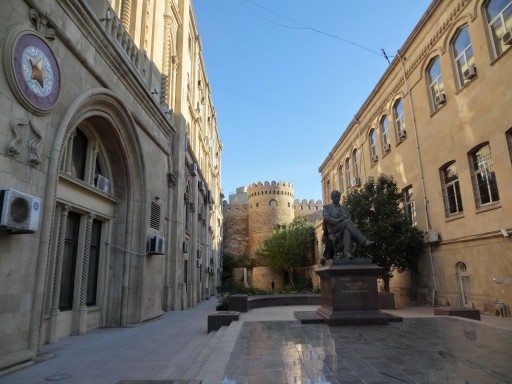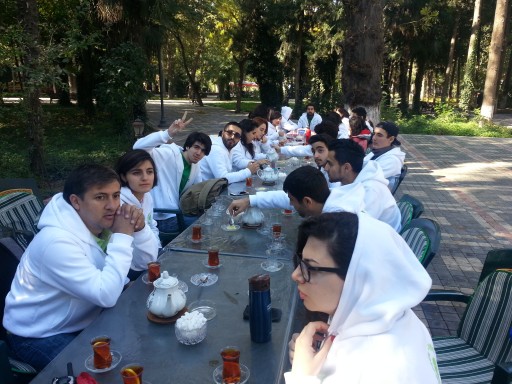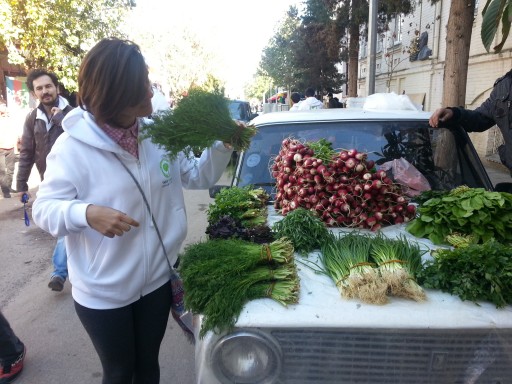A visit to Naturefriends Azerbaijan
The first lights were appearing in the darkness above the Caspian Sea. Red lights like flames shimmering through the dusky clouds. While I was looking through the window of the airplane a story came back to mind. The story was written in a leaflet which I got from the Azerbaijani embassy prior to my visit: ‘At the time God (Allah) allocated the world, he called for all the people of the earth. Everyone came but the representative of the Azerbaijani people. God asked him why he was late and he replied he had to care for his guests. God smiled and said: “There is nothing left of the world, but I give you a piece of paradise.”’
 The plane landed on Baku’s new airport. The airport represents the modern Azerbaijan which the government wants to show to the world, especially during the two big international events that recently took place in Baku: The final of the Eurovision Song Contest 2012 and the first European Games – a sportive event organized by a European version of the International Olympic Committee for which almost 6000 athletes from about 50 countries visited the city in 2015. The European Games are still visible at many places in the city, remnants of the massive marketing campaign that accompanied the event in Azerbaijan.
The plane landed on Baku’s new airport. The airport represents the modern Azerbaijan which the government wants to show to the world, especially during the two big international events that recently took place in Baku: The final of the Eurovision Song Contest 2012 and the first European Games – a sportive event organized by a European version of the International Olympic Committee for which almost 6000 athletes from about 50 countries visited the city in 2015. The European Games are still visible at many places in the city, remnants of the massive marketing campaign that accompanied the event in Azerbaijan.
At the airport I got a warm welcome by Elşən Nuriyev, Advisory Board Member at Təbiət Dostları (Naturefriends Azerbaijan). He had organized an accommodation for the first few days of my trip, before the start of the training course to which IYNF was invited and I had the pleasure to be its representative. Naturefriends Azerbaijan are a new partner organization of the IYNF network since 2014. They organise most of their activities in two clubs. The bike club is a group of young Azerbaijani who like cycling. It organises bike trips and advocates for bike usage in a society without bicycle tradition. The ecotourism club supports the idea of ecotourism and offers trips to the beautiful nature of Azerbaijan.
Furthermore, training courses and international activities are organized to introduce young citizens to those topics. I stayed with two incredible sisters who gave me – supported by other members of the Naturefriends Azerbaijan – a wonderful introduction to Azerbaijani culture and food. Hospitality is very important in Azerbaijan and so is the tea culture. Azerbaijanis drink tea at many times a day. It is served with lump sugar and lemon and an important part of their hospitality.
 The area that is today covered by the Azerbaijani nation has a cultural history of more than 8000 thousand years. In 643AD Muslim Arabs came to the area. The Islam is still the dominant religion. However, many cultural and spiritual influences touched Azerbaijan because the territory was dominated by several powers throughout the centuries and its location at a side route of the Silk Road made it a stop of many merchants. Furthermore, nowadays especially in Baku many secular influences are present. Over time Persian influence in the South and Russian influence in the North consolidated. More than half of all people with Azerbaijani cultural roots live in Iran today. The northern territory, which equals modern Azerbaijan, formed from 1918 till 1920 the Republic of Azerbaijan. However, after this short time, it was conquered by the Red Army and became a Soviet Republic within the Soviet Union. The Soviet past is visible in many things, for example the classical Soviet car Lada that is present at many places. Since 1991 Azerbaijan is independent again and struggling for its place among the world’s nations. This process is undermined by an old conflict about the region of Karabakh, a territory which is, according to the UN, part of Azerbaijan but de facto under the control of Armenia. In this armoured conflict people still die recently along the border. However, due or maybe nevertheless of its history, Azerbaijan has strong connections and good relations to most of its neighbors, especially Russia, Turkey and Iran.
The area that is today covered by the Azerbaijani nation has a cultural history of more than 8000 thousand years. In 643AD Muslim Arabs came to the area. The Islam is still the dominant religion. However, many cultural and spiritual influences touched Azerbaijan because the territory was dominated by several powers throughout the centuries and its location at a side route of the Silk Road made it a stop of many merchants. Furthermore, nowadays especially in Baku many secular influences are present. Over time Persian influence in the South and Russian influence in the North consolidated. More than half of all people with Azerbaijani cultural roots live in Iran today. The northern territory, which equals modern Azerbaijan, formed from 1918 till 1920 the Republic of Azerbaijan. However, after this short time, it was conquered by the Red Army and became a Soviet Republic within the Soviet Union. The Soviet past is visible in many things, for example the classical Soviet car Lada that is present at many places. Since 1991 Azerbaijan is independent again and struggling for its place among the world’s nations. This process is undermined by an old conflict about the region of Karabakh, a territory which is, according to the UN, part of Azerbaijan but de facto under the control of Armenia. In this armoured conflict people still die recently along the border. However, due or maybe nevertheless of its history, Azerbaijan has strong connections and good relations to most of its neighbors, especially Russia, Turkey and Iran.
The first part of the training course of Naturefriends Azerbaijan was in Baku, the second part in the second biggest city of the country Gəncə (Ganja) and the third part in Göygöl National Park. The long journey from Baku to Ganja through the Azerbaijani traffic offered the first good opportunity to get to know the participants a little bit better. Azerbaijani traffic is a bit uncommon for Western foreigners. The first thing you notice when you enter a car is the absent of a seat belt (at least in older cars). Traffic rules generally have only limited practical meaning. For example, three lanes in theory are often five lanes in practice. Traffic lights seldom exist. Furthermore, the Western car driver must get used to animals of all size crossing the street.
Göygöl National Park is located in the Northern part of the Lesser Caucasus. Its focal point is Lake Göygöl. The lake was created after an earthquake in the twelfth century. The water is incredibly clean and clear. Göygöl National Park is one of several national parks in Azerbaijan. The National Parks make it possible to experience the diverse nature in the country that is influenced by the two major mountain ranges of the Caucasus and the Lesser Caucasus, the Caspian Sea in the East, the steppe-like climate around the capital Baku, and more climate zones.
 Azerbaijan is home of 9 out of 11 climate zones of the world. However, the training course offered more than a trip to beautiful nature. The participants learned about the surrounding, challenges to the nature, their own psychology and group leading skills, as well as practical things about exploring the nature. Furthermore, they saw presentations about Naturefriends Azerbaijan, IYNF, and the Naturefriends network. Thankful for the hospitality and the great experiences together with the members and participants of Naturefriends Azerbaijan I returned home.
Azerbaijan is home of 9 out of 11 climate zones of the world. However, the training course offered more than a trip to beautiful nature. The participants learned about the surrounding, challenges to the nature, their own psychology and group leading skills, as well as practical things about exploring the nature. Furthermore, they saw presentations about Naturefriends Azerbaijan, IYNF, and the Naturefriends network. Thankful for the hospitality and the great experiences together with the members and participants of Naturefriends Azerbaijan I returned home.
As representative of IYNF I got an interesting insight in the organization as well as the country, its people, and the culture. Naturefriends Azerbaijan is a great new partner for IYNF. It is definitively worth for IYNF member organizations and volunteers to get in touch with them.
